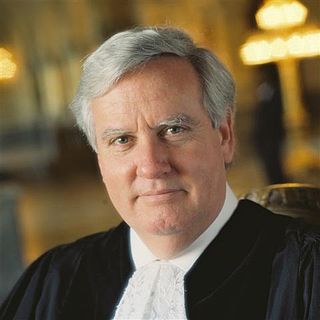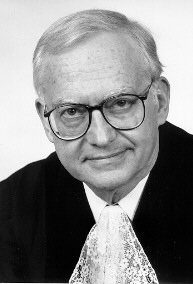
The International Court of Justice, or colloquially the World Court, is the only international court that adjudicates general disputes between nations, and gives advisory opinions on international legal issues. It is one of the six organs of the United Nations (UN), and is located in The Hague, Netherlands.

The United Nations General Assembly, UNGA; French: Assemblée générale des Nations unies, AGDNU is one of the six principal organs of the United Nations (UN), serving as its main deliberative, policymaking, and representative organ. Currently in its 79th session, its powers, composition, functions, and procedures are set out in Chapter IV of the United Nations Charter.

A United Nations Security Council resolution (UNSCR) is a United Nations resolution adopted by the Security Council (UNSC), the United Nations (UN) 15-member body charged with "primary responsibility for the maintenance of international peace and security".

A United Nations resolution is a formal text adopted by a United Nations (UN) body. Although any UN body can issue resolutions, in practice most resolutions are issued by the Security Council or the General Assembly, in the form of United Nations Security Council resolutions and United Nations General Assembly resolutions, respectively.

United Nations Security Council resolution 1244, adopted on 10 June 1999, after recalling resolutions 1160 (1998), 1199 (1998), 1203 (1998) and 1239 (1999), authorised an international civil and military presence in the Federal Republic of Yugoslavia and established the United Nations Interim Administration Mission in Kosovo (UNMIK). It followed an agreement by Yugoslav President Slobodan Milošević to terms proposed by President of Finland Martti Ahtisaari and former Prime Minister of Russia Viktor Chernomyrdin on 8 June, involving withdrawal of all Yugoslav state forces from Kosovo.

Sir Christopher John Greenwood is Master of Magdalene College, Cambridge and a former British judge at the International Court of Justice. Prior to his election, he was professor of international law at the London School of Economics and a barrister who regularly appeared as counsel before the International Court of Justice, the European Court of Human Rights, the English courts, and other tribunals.

United Nations Security Council Resolution 11 was adopted on 15 November 1946. Under the conditions of Article 93, Paragraph 2 of the Charter of the United Nations, the Council recommended that the General Assembly admit Switzerland to the International Court of Justice.
The following outline is provided as an overview of and topical guide to the United Nations:
United Nations Security Council Resolution 58 was adopted on September 28, 1948. The Swiss Confederation had just joined the International Court of Justice (ICJ) but was not yet a member of the United Nations and the council was asked to make recommendations. The Council recommended that Switzerland and any other state that should find itself in this position be allowed to participate in all the elements of the General Assembly pertaining to the ICJ including the nomination of new members, elections, etc.
United Nations Security Council Resolution 71 was adopted on 27 July 1949. Asked by the General Assembly under what conditions Liechtenstein might become a party to the Statute of the International Court of Justice, the Council determined that should Liechtenstein accept the provisions of the Statute, accept all the obligations of a member of the United Nations under Article 94 of the Charter, undertake to contribute to the expenses of the Court and ratify the Statute, Liechtenstein would become a party to the Statute of the International Court of Justice.
United Nations Security Council Resolution 284, adopted on July 29, 1970, submitted the following question to the International Court of Justice for an advisory opinion: "What are the legal consequences for States of the continued presence of South Africa in Namibia notwithstanding Security Council resolution 276 (1970)?". The Council requested the Secretary-General transmit the resolution, along with all documents likely to shed light on the question to the Court.

United Nations Security Council Resolution 395, adopted unanimously on August 25, 1976, after hearing various points by the foreign ministers of Greece and Turkey regarding a territorial dispute in the Aegean Sea, the Council noted the ongoing tension and called on both sides to exercise restraint and enter negotiations. It also made both countries aware that the International Court of Justice is qualified enough to be able to settle any remaining legal disputes.

United Nations Security Council resolution 627, adopted unanimously on 9 January 1989, after noting the death of International Court of Justice (ICJ) President Nagendra Singh on 11 December 1988, the council decided that elections to the vacancy on the ICJ would take place on 18 April 1989 at the Security Council and at the General Assembly's 43rd session.

United Nations Security Council resolution 805, adopted unanimously on 4 February 1993, after noting the death of International Court of Justice (ICJ) judge Manfred Lachs on 14 January 1993, the Council decided that elections to the vacancy on the ICJ would take place on 10 May 1993 at the Security Council and at a meeting of the General Assembly during its 47th session.

United Nations Security Council resolution 979, adopted without a vote on 9 March 1995, after noting the death of International Court of Justice (ICJ) judge Roberto Ago on 24 February 1995, the Council decided that elections to the vacancy on the ICJ would take place on 21 June 1995 at the Security Council and at a meeting of the General Assembly during its 49th session.

United Nations Security Council resolution 980, adopted without a vote on 22 March 1995, after noting the resignation of International Court of Justice (ICJ) judge Sir Robert Yewdall Jennings which would take effect on 10 July 1995, the council decided that elections to the vacancy on the ICJ would take place on 12 July 1995 at the security council and at a meeting of the General Assembly during its 49th session.

United Nations Security Council resolution 1278, adopted without a vote on 30 November 1999, after noting the resignation of International Court of Justice (ICJ) judge Stephen M. Schwebel taking effect on 29 February 2000, the council decided that elections to the vacancy on the ICJ would take place on 2 March 2000 at the security council and at a meeting of the General Assembly during its 54th session.

United Nations Security Council Resolution 1926, adopted unanimously on June 2, 2010, after noting the resignation of International Court of Justice (ICJ) judge Thomas Buergenthal with effect from September 6, 2010. The Council decided that the election to fill the vacancy would take place on September 9, 2010 at a meeting of the Security Council and at a meeting of the General Assembly.

United Nations Security Council resolution 1571, adopted without a vote on 4 November 2004, after noting the resignation of International Court of Justice (ICJ) judge Gilbert Guillaume taking effect on 11 February 2005, the council decided that elections to the vacancy on the ICJ would take place on 15 February 2005 at the security council and at a meeting of the General Assembly during its 59th session.
United Nations Security Council Resolution 1828 was adopted on 31 July 2008.












